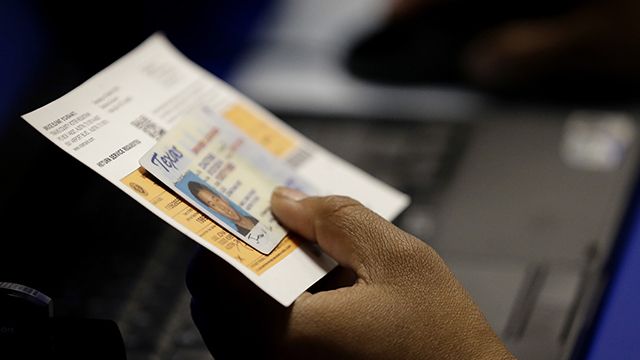

Bates was 25 when the Voting Rights Act passed in 1965, abolishing poll taxes and other discriminatory voting practices. For most of her life she did not face hurdles to the ballot box like her grandmother did.
But in 2013, that changed. Bates was no longer able to vote because her home state of Texas passed a new restrictive voter ID law. To get an acceptable photo ID, she first needed to pay $42 for a birth certificate. The cost was too much: “We couldn’t eat the birth certificate,” she testified in a lawsuit, “and we couldn’t pay rent with the birth certificate.”
Bates is an example of the hundreds of thousands, perhaps even millions, of Americans who now face difficulties voting because of new state laws restricting the right to vote. On the 50th anniversary of the Bloody Sunday march, which galvanized support for the VRA, these Americans remind us that the struggle is not over.
After decades of progress, the past five years has seen the most extensive attack on voting rights since the VRA was signed into law. Since 2011, every state but one has considered legislation that would make it harder for many eligible citizens to vote, and half the states passed new voting restrictions. By the 2014 election, after lawsuits and repeal efforts, voters in 21 states faced tougher voting rules than they did in 2010.
These new voting restrictions — which go beyond Texas-style photo ID laws and include things like early voting cutbacks and voter registration restrictions — apply to everyone. But they are not neutral in their impact. While most people do have a driver’s license or a similar state-issued photo ID, for example, the 11 percent of Americans who do not are disproportionately African-American and Latino.
And while most people still vote on Election Day, minorities make up a disproportionate number of those who voted on the weekend and other early voting days cut in states like North Carolina and Ohio. The net effect of these changes is a voting system that is less accessible to minorities, especially those with modest incomes.
Race has played a significant role elsewhere as well. The push to restrict voting came after a surge in participation among African-Americans and certain other groups in 2008. Recent studies found that the more a state experienced increases in minority and low-income voter turnout, the more likely it was to push and pass laws cutting back on voting rights. The Brennan Center similarly found that of the 11 states with the highest black turnout in 2008, seven passed laws making it harder to vote. Of the 12 states with the largest Hispanic population growth in the 2010 Census, nine states did so. And of the 15 states that used to face special monitoring under the VRA because of a history of racial discrimination in elections, nine states passed laws that make it more difficult to vote.
Unfortunately, efforts to restrict voting show no signs of abating. In the first few weeks of this year, legislation was introduced in 17 states and already progressed in two.
All this points to an urgent and continuing need for strong legal protections for voting rights — protections sought and won by the brave marchers 50 years ago in Selma. But here’s the rub: in the midst of a controversial and racially-charged battle over voting rights, the US Supreme Court gutted a core provision of the VRA. The net result has been not only a loss of voter protections in the courts but also a marked increase in discriminatory voting changes in states that used to be covered by the law. This contributes to a growing lack of respect for voting rights — arguably the defining feature of American democracy.
So what can we do? For starters, urge Congress to update and restore the Voting Rights Act. Urge your state not to pass retrograde voting restrictions, and instead to modernize the voter registration system and adopt other sensible improvements like those recommended by a recent bipartisan presidential commission. And join the tens of thousands of Americans flocking to Selma this week in honoring one of our nation’s greatest accomplishments — the recognition of the equal right to vote for every eligible American.
We have come a long way, but we still have farther to go.
The views expressed in this post are the author’s alone, and presented here to offer a variety of perspectives to our readers.


